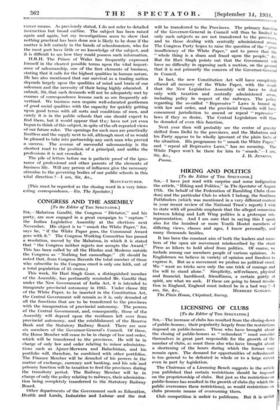CONGRESS AND THE ASSEMBLY
[To the Editor of THE SPECTATOR.] Sin,—Mahatma Gandhi, the Congress " Dictator," and his party, are now engaged in a great campaign to " capture " the Indian Legislative Assembly at the elections next November. His object is to " smash the White Paper," for, says he, " if the White Paper goes, the Communal Award goes with it." The Congress Working Committee has passed a resolution, moved by the Mahatma, in which it is stated that the Congress neither rejects nor accepts the Award." This has been called by all the Hindus and Moslems outside the Congress as " Nothing but camouflage." (It should be noted that, from Congress Records the total number of those who subscribe to the Congress creed is only one lakh, out of a total population of 35 crores.)
This week, Sir Hari Singh Gour, a distinguished member of the Assembly, has pertinently reminded Mr. Gandhi that under the New Government of India Act, it is intended to inaugurate provincial autonomy in 1935. Under clause 202 of the White Paper, to be inserted in the Constitution Act, the Central Government will remain as it is, only denuded of all the functions that are to be transferred to the provinces with the inauguration of provincial autonomy. The powers of the Central Government, and, consequently, those of the Assembly will depend upon the residuum left over from provincial autonomy, and the establishment of the Reserve Bank and the Statutory Railway Board. There are now six members of the Governor-General's Council. Of these, thg Home Member will cease to be in charge of law and order, which will be transferred to the provinces. He will be in charge of only law and order relating to minor administra- tions such as Ajmer-Merwara and Baluchistan, and his portfolio will, therefore, be combined with other portfolios. The Finance Member will be denuded of his powers in the matter of exchange, currency and banking, and his sole and primary function will be taxation to feed the provinces during the transitory period. The Railway Member will be in charge of only the policy relating to railways, their administra- tion being completely transferred to the Statutory Railway Board.
Other departments of the Government such as Education, Health and Lands, Industries and Labour- and the rest
will be transferred to the Provinces. The primary function of the Governor-General in Council will thus be limited to only such subjects as are not transferred to the provinces, and to those dealing with centrally administered areas. The Congress Party hopes to raise the question of the " gross insufficiency of the White Paper," and to prove that the " whole thing is a sham and fraud upon the people," &c. But Sir Hari Singh points out that the Government will have no difficulty in opposing such a motion, on the ground that it is not primarily the concern of the Governor-General in Council.
In fact, the new Constitution Act will have completely effaced all memory of the White Paper, with the result that the New Legislative Assembly will have to deal only with taxation and centrally administered areas, including policy in respect of the railways. The policy regarding the so-called " Repressive " Laws is bound up with law and order, and the provincial Councils will have concurrent jurisdiction to amend or repeal " repressive " laws if they so desire. The Central Legislature will thus be denuded of even this function.
Next year then will probably see the centre of gravity shifted from Delhi to the provinces, and the Mahatma and his Party appear to be wholly ignorant of the plain facts of the situation. His programme to " smash the White Paper," and " repeal all Repressive Laws," has no meaning. The White Paper won't be there for him to " smash."—I am,










































 Previous page
Previous page